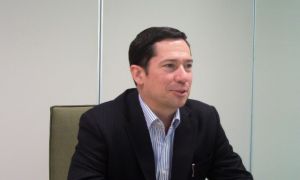
We recently spoke to Miles about starting, growing and listing a business in Canberra and about his plans for the future.
Miles joined the military straight from school and was employed as an Intelligence officer for 13 years providing geostrategic advice on threat and global issues impacting on Australia.
Miles spent a lot of time away from home during this period but also managed to complete a Degree in Science with Honours and also studied two languages.
Miles says, "The military was good for a young man straight out of school because it provided a lot of discipline and responsibility at a young age". It also provided Miles with a good education and skills, and an opportunity to see the world. The military is a good place for a young man but it's not terribly conducive to having a family says Miles.
"My wife counted how many days I was away from home - 180 days in our first year of marriage, 220 in the second and 365 in years 3 and 4. She said that in order to have a 5th year of marriage a career rethink was required."
Miles did leave the military and went to work for a large multinational firm in Asia running three of their business operations I asked Miles how he managed the transition. He says that the Army taught him how to take large volumes of data and analyse that to identify options and strategic solutions and to make informed recommendations. He used these skills to match the needs in the market.
Necessity the Mother of Invention
Miles came back to Canberra at short notice in 2000, when his 18-month-old daughter became very ill and had to be medically evacuated to Perth for lifesaving treatment. He came back to Canberra to be near family. According to Miles employment options in Canberra at that time were limited: It was Christmas so the Public Sector was pretty much closed and the private sector, while they liked his skill set, weren't hiring at the time. He was told to come back in February or March when hiring restarted. He didn't have that luxury. Miles says, "I had no home, no car and a sick child - I needed an income. I couldn't find a job, so I became self-employed by default."
When asked how he started, he said he thought that he was pretty good at strategic change and complex problem solving and not much good at anything else. So he looked at the management consulting market and identified a number of potential clients that he thought were a good match for his skill sets. He focused on Australian Protective Services (APS) which was an off budget agency that had three years of negative revenue.
Miles says, "The APS had gone from $80m turnover to somewhere near $40m and there were obviously some real issues inside the business, so I made an appointment to meet the Director General."

Miles goes on to say that the Director General was quite candid and said that he had been approached by many consultants who offered to write reports for $1000 per day to tell him what was wrong. Miles decided to take a different approach and told the Director General that he was here to solve the problem and was prepared to invest in the solution.
Miles offered a payment plan of $100 per day, which put food on the table for his family and 10 percent of any improvement he achieved for the business through increasing revenues, productivity, or decreasing costs. "I found the APS an improvement of $16million in three months and earned 10 percent of this". Miles used this to transition from a sole trader to a proprietary company.
Miles started Jakeman Business Solutions (JBS) as a sole trader in 2001 and transitioned to a Pty Ltd structure in September 2002. Miles then put an Employee Share Plan (ESOP) in place in 2005 to share the success of the company's growth with his team. Again, this was novel for a Canberra start-up and won him lots of loyalty and goodwill with his team.
But it was not without complications: He recalled from his high school accounting, that a company was limited to 50 shareholders. JBS was growing at such as rate that he had no option but to become an unlisted public company; so The Citadel Group Limited (a new entity created by JBS) was launched in 2007.
Recruit for your Weaknesses
We asked Miles about the advice he would give to someone starting out in business that doesn't have all the skills they need. "It is very important to continue to learn and grow, and to bring in people that have the skills you don't". Miles says he was very lucky to be in his own business and he could pick the people that he wanted to work with that could address his weaknesses.
Miles describes himself as an extreme introvert and getting sales and business development skills in-house were key to the company's success. He also said that when Citadel's turnover reached $25 million he realised that his accounting skills were no longer up to par and he went and sourced a CFO from GE in America. This he believes has been pivotal to where the business is now.
It took 7 years to get from 0 to 300 staff and an unlisted company, and it was only another 7 years from implementing the Employee Share Plan through to being listed on the ASX (this was completed in November 2014). Share value has gone up 80 percent in 6 months, a result Miles was remarkably modest about and credits solely to his team and staff.
When asked how honest you have to be with yourself about your skills, Miles says it is vital and you are candid about your own strengths and weaknesses.
"You need to keep looking at yourself in the mirror. There is a point that everyone, including me, will come to when the business outgrows your skills. You address this by implementing succession planning to make sure you don't set the business up for failure when this time comes."
When the Business outgrows the Founder
Miles says putting a succession plan in place for a company that has grown so quickly is an integral part of Citadel's career talent management framework, which covers everything from initial recruitment, development, promotion, performance management, fast-tracking good talent and transitioning out. Each senior manager has as a KPI the need to identify and train their successor.
"As a senior manager, I have to recruit, upskill and mentor them. I have to let them make their own mistakes and build that into our system. Currently I have four general managers, all of whom can step in for me should I get hit by a bus."

Growth by Acquisition
In the early days, Miles relied on just organic growth. Later, he supplemented this with an acquisition strategy to grow faster: The company grew from $0 to $25 million turnover organically in less than 5 years and then doubled in 12 months through acquisitions. Miles referred to this as a nice small business – many of us can only wish. We asked whether this was a difficult strategy to implement. The benefits of acquisition, says Miles, are that you can add scale and IP really quickly, it's a speed to market issue.
"Any value that comes with that acquisition adds to your value proposition to customers without them waiting for you having to build it."
Acquisitions are hard and should not be underestimated says Miles.
"The downside is that you have to fund it – through debt or equity. It is all about caveat emptor 'buyer beware'. Due diligence is key."
He goes on to say, "If the company being acquired is small and in a different market, they tend to be open and discovery is easy and the benefits easier to define. In the same sector they tend not to be so open with disclosure and you may end up with something you weren't aware of."
Miles stresses that with any acquisition in a services business, the people are key. They need to have the same value sets and culture.
"You need to be able to retain the key people in that business in order to continue the success." Miles recounts that his first acquisition was a 5 person partnership, he bought the partners out and they all become shareholders so they were all aligned with a common goal. Miles also recommends some kind of deferred consideration or earn out period so people get appropriately awarded if they hit or over-achieve targets, but also a downside if they under-achieve. This means everyone is protected and there is a clear feeling of ownership and alignment.
Miles says you can't force businesses to integrate; you have to integrate them in a way that makes sense. This arrangement works particularly well with SME – this is called 'co-opetition'.
"There is a lot of complexity in bidding for work these days and often you need to compete and sometimes you need to cooperate, often with a competitor, in order to deliver on the customer requirement".
"If you do this, it is important to have the basis of the partnering arrangement sorted up front – what is each SME partner going to deliver, what are the arrangements for this, the basis of the partnership what and how is everyone going to be renumerated – this removes all confusion and sets the basis on which the job gets delivered," says Miles.
Miles believes that, in the end, you continue to work with those who do it well. You will get burned occasionally and you will never work with those people again.
Bringing in Expertise
We then moved on to discuss the good and bad of going from a company where you have a lot of control into one that is now pretty much on the public stage. Miles said, "You need to be comfortable with where the business is and what you role is in it. There is nothing wrong with having a corner store and being the sole proprietor where you can shut the door at the end of the day, having worked hard and earned and honest income - if that is life your goal then that's perfect. If your life goal is to own and build something tangible and leave a bit of a legacy then you need to architect a structure and a transition plan to achieve that."
Miles wanted to build a company that would survive him or any one individual. For him, the listing process was the most sensible path to do this.
Miles describes the listing process as complex with a lot a due diligence, governance and checks and balances.
"You have to be ready for investors and there is lot of due diligence conducted on you and there are a lot of director's liabilities at play."
Miles makes the point that all businesses have gaps and there generally isn't a lot of cash to throw around to sort these out, so he brought in good advisers. Miles was very prudent with his approach. He had to let go of some business functions and brought in a good board to help him through this process. Miles said that it wasn't that dissimilar to what he did in 2005 when he brought in the first Employee Share Options Program.
Miles says, "I bought in a board to show those that had invested in the company that the money was being independently managed and not controlled by me." At the time, he had the former CFO of Defence and former Director General Secret Intelligence Service on his first board. He now has the current chair of the Macquarie Group, the first female MD of Telstra, and the former Chief of Army on his current board. This is a board Miles is justifiably proud of.
We asked Miles how a start-up goes about identifying the right people for a board. Miles suggests, "Firstly understand yourself, the gaps in your skills, the weaknesses in you and your team, and then you need to find individuals that you trust and that will tell you the truth warts and all.
"You need those people that will give you tangible and constructive advice, guide and be honest. You don't want those who will just tell you what you want to hear."
We discussed paying board members and Miles believes that through networks like Lighthouse and Capital Angels you will find mentors willing to give their time (within reason).
"Canberra is a well -connected and supportive community, but there will be those that expect to be paid. But remember that it doesn't have to be money, it can be equity", says Miles.
Staying in Canberra
We asked Miles why he stayed in Canberra after listing. For Miles it was very much a lifestyle choice and family reasons. He didn't like Canberra when he started at Duntroon as a 17 year old; it was too far away from the beach and quite an insular community.
"People with short hair weren't always the flavour of the month."
"It has changed a lot. It has grown up as a town and it's a good place to network, do business and bring up a family. You can meet all the decision makers. If you are good at your game it's easy to be referred through; if you are bad at your game you can lose your reputation very quickly."
It suits Miles for now, but he is aware that it won't always suit Citadel and offices are already being opened all over Australia.
We asked Miles whether he thought Canberra was a positive or a negative in terms of doing business outside the ACT. Miles said it was originally a big negative but it is slowly changing.
"The business community in Canberra is often seen as second rate by many Canberrans. The Public Sector is well respected; the university sector is well regarded, but the private sector not so much." Miles says that it is still very difficult to be an entrepreneur and businessman in Canberra.

"Despite having a $180 million market capitalisation business; Citadel does little-to-no business with the ACT Government. They don't like buying local, don't seem to understand the importance of growing jobs locally – it seems to be a bit of tall poppy syndrome."
When asked what can we do to change this, Miles says there are a lot of buy local support programs that can be put in place - a lot of councils already do this.
"This could be through preferential procurement – it's about being proud of what we do here."
Miles goes on to say, "The business community networks well here, but they do it themselves. It is a common problem in that local success stories often aren't recognised by our own leaders."
Miles adds that there are many example of intellectual capital that haven't received support and have left Canberra and gone on to create successful companies offshore.
Using Employee Share Options to Grow your Business
We asked Miles to tell us more about how he used an ESOP to grow his business. Miles says in Silicon Valley it's a common approach.
"Using sweat equity as a way of engaging staff when the company has little money and rewarding them in share holdings so they get the benefit as the company starts to grow is a sound approach. The tax system in Australia works a little bit against us, but there is also a cultural mindset that because these are uncommon they are still to be proven."
Miles was keen to set one in place because it was a good way to reward and involve good staff.
"It was a way of ensuring the longevity of the intellectual capital that is the core of a services business –you lose good people you lose good skills." Miles however, did it slightly differently, he made people put their hands in their pockets to buy the equity and the company offered a loan scheme that allowed people to purchase the equity over time. Today, all but two of the original shareholders still hold equity in the business. Miles again credits this as a team effort.
Future of Work
We next discussed the Future of Work and where the Australian Business Academy (ABA) - Citadel's registered training organisation (RTO) sits in this. Miles said that currently ABA offers up to Advanced Diplomas and has applied for a licence to become a private higher education provider of Degree courses.
"It is a conflicted issue at the moment because the education sector is so highly regulated – you have to go through a whole lot of regulatory process and stakeholder engagement and by the time it's done, the content is pretty much out of date. The system is not maintaining pace with change in technology for example."
Miles says that ABA tries to overcome this time lag, by working with the private sector to understand what they need from future employees.
"Our travel and tourism students for example, learn all the required skills so they are work ready as soon as they walk into an employer's office. There is also a strong focus on internships with value. Our Graphic design students, for example, have to produce a portfolio as part of their internship and so the employer gets to see them and the students get to see what the employer needs and can tailor their content and learning to match."
Miles believes that this approach should be applied to tertiary education in general.
"Tertiary education institutions do a good job teaching analytical thinking and processing, but there is no onus on them to find employment for those students. So they are generating a lot of accountants and lawyers, etc with no jobs to go to. Having internships and better linkages with private industry is critical. The trends around the world are changing and business is actually helping educators structure their courses."
Miles recently saw an example where IBM is running the school's science and technology classes inside the year 11 and 12 curriculum in the US.
Future Plans
The final question we asked was, where to next for Citadel and for you personally? Miles said that the company was currently valued at $180 million and around $220 million is required for entry into the top 300 Australian companies.
"Our aim is to get there as soon as possible to increase return to shareholders, create more liquidity and greater awareness. In two years' time we then want to be knocking on the door of the ASX 200 and be truly national and push into the region. We want to retain Citadel and the subsidiary brands because they each have their own secret sauce. It will be more of the same but at a larger scale."
Miles says that whilst ever there is a relationship with the Federal government, Citadel will always have a footprint in Canberra, but other offices are certainly growing very quickly.
As far as Miles goes, he has always said to the board that he serves at their discretion and when he hits the Peter Principle (the company outgrows him) whether it's a scale, attitude or interest thing, then it's up to the board to decide on his replacement. He does not want to be the key man risk for the business.

Miles is a firm believer in the one foot on the ground analogy.
"Before you take that next step, whether it's a growth or diversification – you make sure you have your systems in place before you take that next step. You need to invest in your business before you take that next step so that you don't get caught short."
When asked how you step outside the business when you first start out, Miles says it is difficult and there is not easy way to do it.
"But as you get bigger, you have to be more disciplined. I use the motto; I work for my sent items box not the inbox. This makes me focus on being organised and strategic, setting direction, allocating work, following up, rather than being driven by others".
Miles key lessons for start-ups:
1. Let necessity be the mother of your good ideas;
2. See these ideas through with passion, discipline and focus. If you don't believe in the idea, no one else will;
3. Surround yourself with good people who cover your weaknesses;
4. Be flexible, if the market changes make sure you can be flexible too. The raw truth of business is that you need to go where the money is and you need to be agile enough to follow it;
5. Equity is the most expensive form of debt so don't give it up easily. Don't fear it but use it wisely. Understand the risks and go in 'eyes wide open'. If you truly believe that giving away equity adds value to your business then go for it;
6. To find the right investor, common interests are key. Aim for the principal of smart money –a partner with networks, skills and common values;
7. Make sure you can clearly tell the investor what it is that you are doing.
And for those thinking of leaving the public sector?
1. Believe in yourself. But be cognisant that you may need to change and skill up;
2. You will certainly need to take a new view on things like risk and the time value of money;
3. You have worked in teams so continue to do this. But find people who can teach you to lead and respect and use the specialist skills you have developed.
Miles is very generous with his time and advice and we are very fortunate to call him one of our mentors. Miles is a firm believer in Canberra and says that we all have a role in building the community. He does sometimes wish that all elements of the community had an equal say in how this happens.
About Lighthouse Business Innovation Centre
Lighthouse has a strong track record of supporting entrepreneurs, researchers and inventers on the path from concept to commercialisation. Since July 2008, Lighthouse has worked with over 990 distinct enterprises and provided group and peer based services to over 3400 enterprises and individuals. For over five years Lighthouse has successfully delivered business advice, education, mentorship and networking opportunities to help these businesses commercialise their ideas and grow their companies. Lighthouse also delivers programs such as the ACT Microcredit Program for the ACT Government. Visit www.lighthouseinnovation.com.au for more information.


